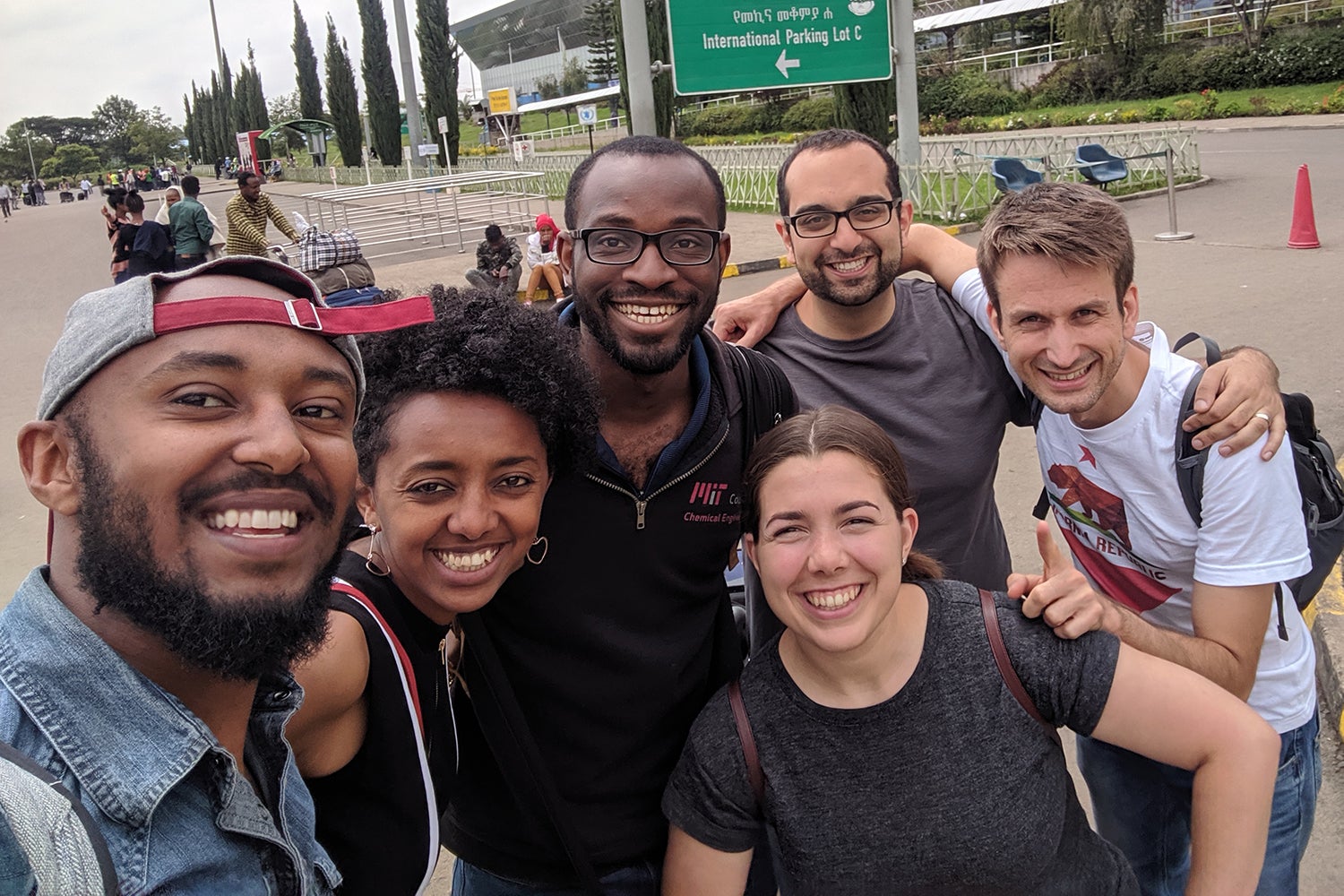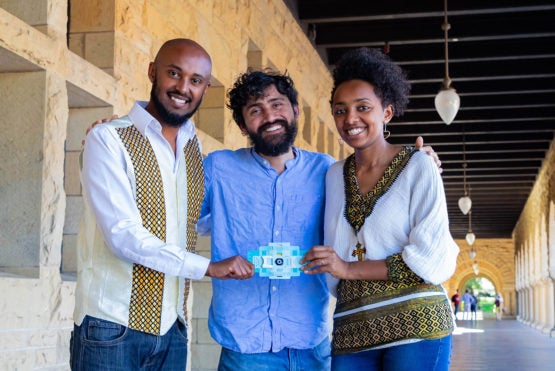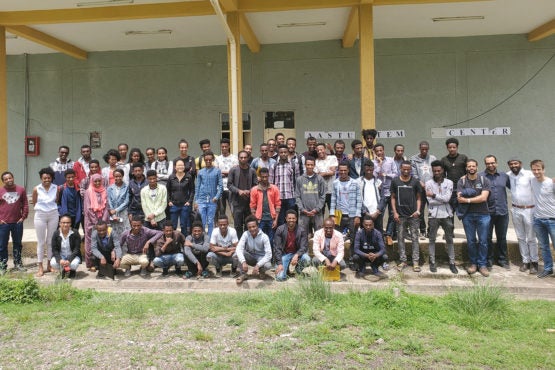Stanford students take STEM home to Ethiopia
This past summer, engineering graduate students Loza Tadesse and Tim Abate returned to their home country of Ethiopia to teach local college students about science research and educational opportunities.
Loza Tadesse and Iwnetim “Tim” Abate may have left their home country of Ethiopia to pursue engineering studies, but they haven’t forgotten their roots. The Stanford engineering PhD students returned home this past summer to share their expertise with college students and expose them to science research and education.

Engineering PhD students Iwnetim “Tim” Abate and Loza Tadesse, left, with their fellow instructors in Addis Ababa, Ethiopia. (Image credit: Courtesy Tim Abate)
Tadesse and Abate convened a team of 13 scientists and graduate students from Stanford, the University of California, Berkeley, Pepperdine University, the University of Chicago, the University of Akron and the University of Toronto. Together, they traveled to Ethiopia’s capital, Addis Ababa, to lead a five-day summer school for some of Ethiopia’s most promising undergraduates in STEM fields. The program was organized in partnership with the Ethiopian Physical Society in North America, where Tadesse and Abate are executive committee members.
“Our goal was to motivate college students back home to pursue higher education – Master of Science degrees and PhDs – and research,” Abate said. “Our summer program was focused on teaching them about the current trends in different fields, how to apply to graduate school, how to apply to internships and find research opportunities.”
Abate and Tadesse reached out to local universities to recruit their best students in STEM fields for the summer school, which was hosted at Addis Ababa University, Addis Ababa Science and Technology University and the University of Gondar. They sought 40 students for the program, but due to the amount of interest, they ended up with 50.
Science as accessible
Each day of the program, students attended classes in science and engineering disciplines – physics; computer science; materials; biological, mechanical and chemical engineering – that were related to the research conducted by the instructors. For instance, Tadesse, a PhD candidate in bioengineering, taught classes related to her Stanford research on improving medical devices for infection diagnostics and bio-inspired engineering design, while Abate, a PhD candidate in materials science and engineering, taught classes about his research on improving lithium ion batteries.
One of their goals was to demonstrate that science is accessible and can be accomplished with limited resources.

Abate, Prakash and Tadesse with a foldscope, a $1 microscope developed by Prakash and other Stanford scientists. (Image credit: Trever Tachis)
“We partnered with professor Manu Prakash from the Stanford Bioengineering Department to teach the students about his foldscope,” Tadesse said. “It’s a $1 foldable microscope that takes minutes to make and can be integrated with a cell phone for imaging. The students have now formed a foldscope club to undertake research using the microscope and to serve as local contacts for future foldscope-related work that Professor Prakash is planning to do in Ethiopia.”
In addition to teaching science, Tadesse, Abate and the other instructors held workshops and discussions designed to expose students to education and research opportunities they may not have known were available to them.
“The key problem back home is the lack of information about what students can do professionally,” Abate said.
A developing country with more than 100 million people, Ethiopia faces many fundamental challenges related to infrastructure, transportation and security, among other areas. As a result, investment in education and research is not necessarily prioritized by the government. So students like Tadesse and Abate often choose to leave.
Giving back
Organizing the summer school was personal for both Tadesse and Abate, since they both experienced challenges pursuing STEM careers. They came to Stanford three years ago for their doctoral studies and have since made a point to give back to their home country by supporting promising Ethiopian students.
“We are working to be the integral part of the country’s change and growth,” Abate said. “Our training abroad is circulating back to help the nation and we want to inspire others to do the same. What we want to show them is that there are people who look like them and grew up in the same situations, and now they’re impacting their country and the world. So that’s why we are doing this.”

Fifty STEM students and 13 instructors participated in the summer school program. (Image credit: Courtesy Tim Abate)
Fifth-year Stanford materials science and engineering student Peter Attia said that working as an instructor in the program made him more aware of accessibility issues in graduate school admissions.
“We need students from all walks of life contributing to solve our planet’s toughest challenges, and I’m positive many of these students would succeed in top graduate programs if given the chance,” he said. “However, many of these students face significant logistical and cultural challenges in applying to and attending graduate school. I hope to push for a more equitable graduate school admissions process.”
Jelani Nelson, a professor of electrical engineering and computer sciences at UC Berkeley, accompanied Tadesse and Abate on the trip. He noted the immense interest in the program from students, some of whom traveled from far away to attend.
“It is clear to me that there’s huge interest amongst university students in Ethiopia for advanced topic summer schools like this one that Iwnetim and Loza created, and it is my hope that the effort continues and that more such programs are created to satisfy the large demand,” Nelson said.
The program was supported by Stanford’s School of Engineering, the National Science Foundation, the American Physical Society and private donors. Due to the overwhelmingly positive response from students in the program, Tadesse and Abate are currently planning to host a summer school again in 2021.
